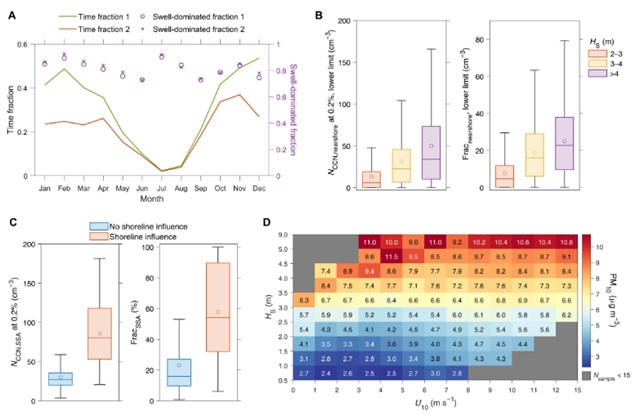
海洋气溶胶(SSA)排放是大气气溶胶的主要来源,影响着全球气候和沿海空气质量。他们关于SSA的大部分知识来自海岸线附近的沿海观测,但这些观测是否以及何时能准确地代表开阔的海洋仍不清楚。
研究表明,在高波期间,强烈的近岸SSA产生大大增强了顺风云凝结核(CCN)和气溶胶质量浓度。强烈的海岸线波浪破碎在全球范围内普遍存在,与当地风分离的涌浪在许多沿海地区起着主导作用。因此,基于沿海测量对开放海洋的外推结果可能会显著高估SSA浓度及其对CCN的贡献,进而高估SSA对云和气候的影响。此外,目前的区域模式无法捕捉到海岸线波浪破碎对沿海气溶胶种群的强烈增强及其对沿海社区的环境影响,这些模式没有参数化近岸SSA产生的主题波能或完全忽略了它。
附:英文原文
Title: Shoreline wave breaking strongly enhances the coastal sea spray aerosol population: Climate and air quality implications
Author: Shengqian Zhou, Matthew Salter, Timothy Bertram, Eduardo Brito Azevedo, Francisco Reis, Jian Wang
Issue&Volume: 2025-08-29
Abstract: Sea spray aerosol (SSA) emission is a major source of atmospheric aerosols, influencing global climate and coastal air quality. Much of our knowledge about SSA derives from coastal observations near shorelines, but whether and when these observations accurately represent open oceans remain unclear. Here, we show that strong nearshore SSA production during high-wave periods greatly enhances downwind cloud condensation nuclei (CCN) and aerosol mass concentrations. Strong shoreline wave breaking is widespread globally, and swell waves, which are decoupled from local winds, play a dominant role in many coastal regions. Therefore, extrapolating results based on coastal measurements to open oceans may significantly overestimate SSA concentration and its contribution to CCN and, by extension, the impact of SSA on clouds and climate. Additionally, the strong enhancement of coastal aerosol population by shoreline wave breaking and its environmental impact on coastal communities cannot be captured by current regional models, which do not parameterize nearshore SSA generation using wave energy or completely neglect it.
DOI: adw0343
Source: https://www.science.org/doi/10.1126/sciadv.adw0343
